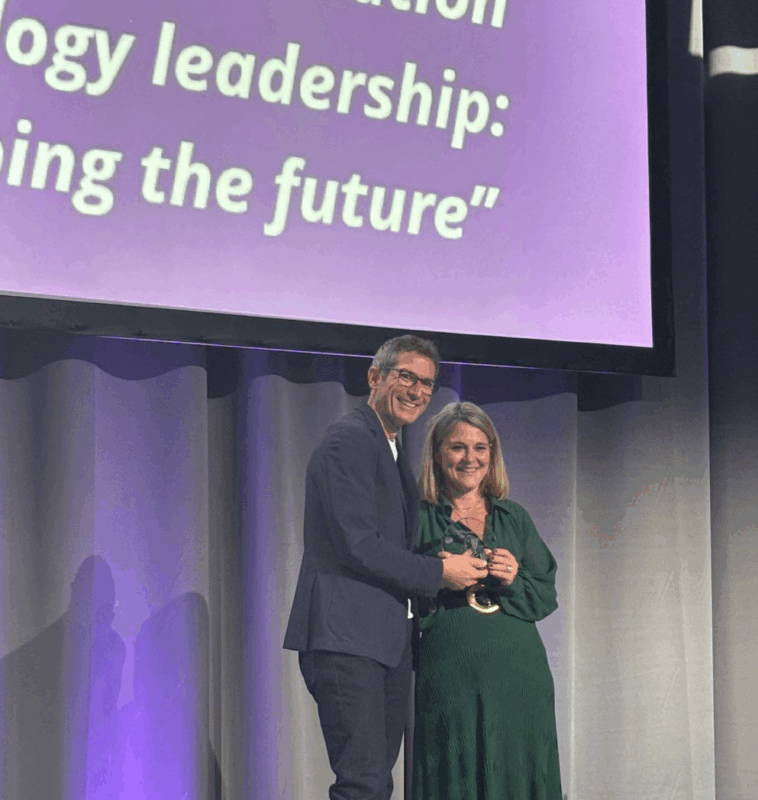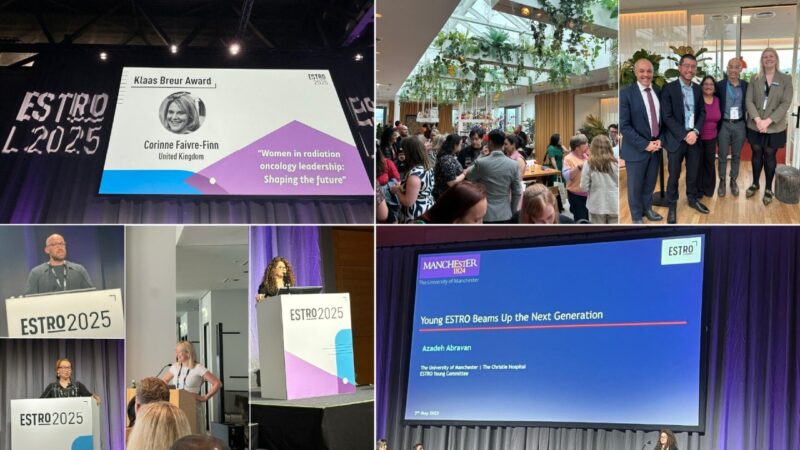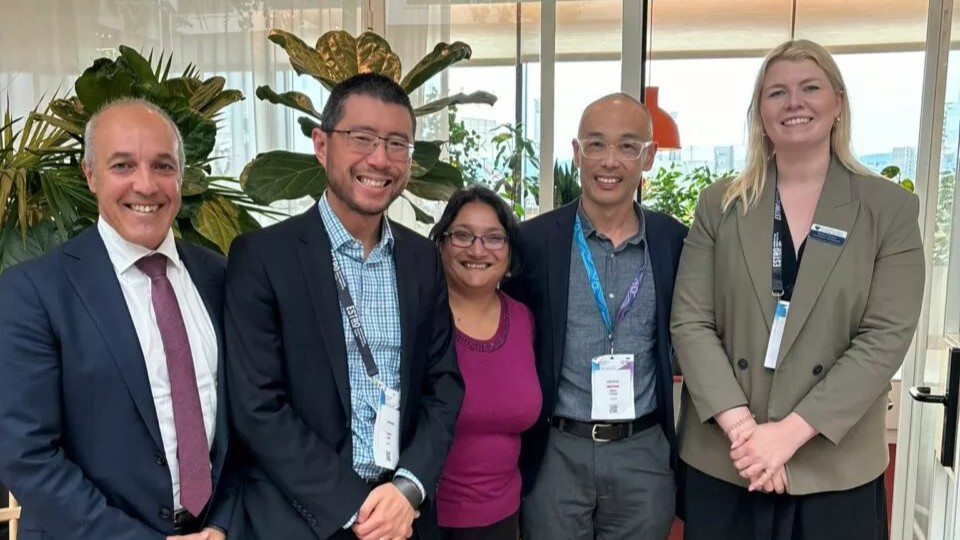Manchester Cancer Research Centre shared a post on LinkedIn:
“Held between 2nd-6th May, ESTRO 2025 provides the opportunity for the radiotherapy oncology community to connect to share the latest research innovations, forge new collaborations, and network and reconnect with peers.
This year held in Vienna, Austria, Manchester researchers descended on the city for an impressive showcase of radiotherapy related research. Over the duration of the conference, Manchester researchers delivered more than 20 research presentations and 39 research posters covering topics from medical physics and sustainable radiotherapy to real-world evidence and radiotherapy combinations.
In this short article we showcase some of the incredible work showcased at the conference:
Klaas Breur Award for Professor Corinne Faivre-Finn
The Breur Award is the highest award that can be bestowed on an ESTRO member recognising significant contributions to the field of radiotherapy. Professor corinne Faivre-Finn is the latest recipient of the award who delivered a talk focused on ‘Women in radiation oncology leadership: Shaping the future’.

The Christie- MCRC – Peter MacCallum Cancer Center Networking
Continuing our annual networking events at ESTRO, this year, the MCRC and The Christie partnered with the Peter MacCallum Cancer Centre in Australia to open the networking event up to more researchers. The event provided an opportunity to network with researchers across the globe, share best practice and continue the ongoing collaborations between Manchester and Melbourne. Our team enjoyed the opportunities to network, connect and celebrate all the successes with funders, researchers, trainees and international alumni audience.
Presentations and Highlights
- Professor Marianne Aznar delivered a talk about artificial intelligence in treatment preparation and delivery.
- PhD student Artemis Bouzaki spoke about the interaction of genetic drivers and dose surfacing mapping for rectal toxicity following prostate cancer radiotherapy.
- PhD student Miren Summers presented about the application of causal inference techniques for accurate estimation of the causal effect of dose to the heart base on overall-survival in lung cancer.
- Dr Angela Davey delivered her systematic review of facial deformation following paediatric head and neck radiotherapy calling for more evidence to support standardised outcomes.
- Professor Peter Hoskin presented about radiobiological general aspects.
- Focusing on green and sustainable research, Dr Rob Chuter gave us tips and tricks that we can implement across all our departments as well as showcasing new sustainability frameworks for radiotherapy departments. Rob also delivered a talk estimating the carbon footprint of ESTRO conferences and modelling how to reduce it.
- Penelope Hart-Spencer. MSc showcased virtual reality in paediatric proton beam and photon beam therapies.
- Louise McHugh discussed patient-related factors impacting upon radiotherapy clinical trial enrolment.
- Dr Love Goyal presented about evaluating cardiac substructure exposure and auto-contouring feasibility in paediatric patients treated with PBT.
- Kicking off day two of ESTRO, Dr Gareth Price presented about the role of real-world evidence in radiation oncology.
- Dr Jonas Willmann continued the discussion for real world evidence presenting about the reirradiation treatment and disease characteristics: interim analysis of the prospective observational E2-RADIatE ReCare cohort.
- Roisin Campbell-O’Donnell presented a service evaluation into camera occlusion using Surface-Guided Radiotherapy (SGRT) for VMAT DIBH breast patients.
- Dr Eliana Vasquez Osorio discussed her work estimating the effect of mean dose to the medulla oblongata on dysphagia after head and neck radiotherapy and how image registration, dose mapping and uncertainties are all incorporated into treatment planning.
- PhD student Charlie Cunniffe presented about the external reproduction of a causal estimation of the individual and cohort benefit of sequential vs concurrent chemoradiotherapy in NSCLC.
- Dr Azadeh Abravan was initiated as the Young ESTRO chair prompting the question did physicists fully take their seat at the ESTRO future leaders table? She also prompted several sessions about visibility and the development of the next generation at ESTRO.
- Azadeh also presented about radiotherapy dose to non-emphysematous lung outperforms whole lung volume in predicting survival in non-small cell lung cancer patients.
- Amen Shamin presented about the genomic landscape of hypoxia in bladder cancer.
- Daniel Welsh delivered a talk about pre-simulation of geometric uncertainties instead of margins for cranial radiotherapy allows an integrated boost while reducing irradiated volumes.
- Alice Greenwood-Wilson presented a preliminary comparison of CT simulation free workflows for MSCC patients on an MR Linac.
- Dr Luisa Vanesa Biolatti discussed how fractionated radiation alters the extracellular matrix produced by muscleinvasive bladder cancer cells.
- Dr Gerard Wells presented about ATM inhibition with AZD1390 and conventional radiotherapy in non-small cell lung cancer: interim report from the CONCORDE phase Ib trial (NCT04550104)
- Dr Gareth Price also presented the first results from the RAPID-RT trial, showing that routinely collected patient data can be used to provide inclusive evidence of changes in radiotherapy practices where conventional trials are challenging.
- Dr Kelechi Njoku presented a prospective database analysis of the impact of systemic inflammatory parameters and immuno-nutritional indices on endometrial cancer survival.
- Dr Conrado Guerrero Quiles discussed his pan-cancer characterisation of the hypoxic extracellular matrix identifies a gene signature predictive of radiotherapy benefit.
- Dr Rob Chuter, Dr Mairéad Daly, Prof. Peter Hoskin and Prof. Marcel van Herk were all involved in research debates throughout the conference, delivering their perspectives on topics from
We’re delighted that so much Manchester research was presented at this international conference and look forward to presenting and showcasing innovations from Manchester to the academic research community at future events.
Thank you to Rachel Chown and Jenny Espin for providing photos and organising such an incredible networking event on the Sunday!”

More posts featuring ESTRO2025.


